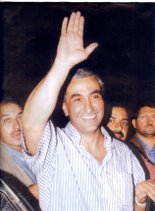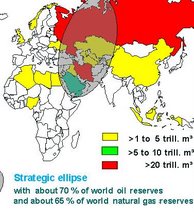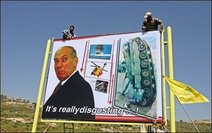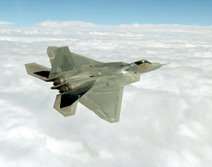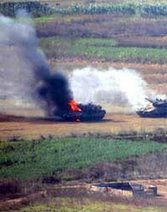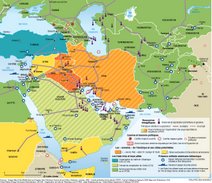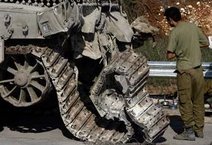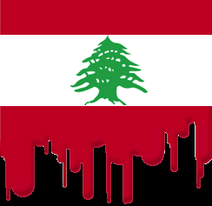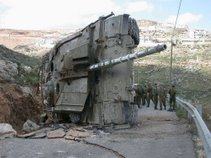
Is Israel Pre-Staging War with Iran?
We know how well-timed crises are deployed by those skilled at displacing facts with what people can be induced to believe. Thus the use of staged crises linked to fixed intelligence as a way to influence decision-makers. That behavior was on display when policy-makers were persuaded to invade Iraq in response to the mass murder of 9/11—buttressed by an induced belief in Iraqi WMD, Iraqi ties to Al Qaeda, mobile biological weapons laboratories, meetings in Prague, and so forth.
Fast-emerging events suggest pre-staging meant to make an attack on Iran appear reasonable, even desirable. Agent provocateur operations require the staging of collateral events to induce the intended main event. Does that suggest the US and the EU should expect another crisis on the scale of 9/11 as a means to catalyze that attack?
Throughout history, dedicated groups have seen their beliefs manipulated to serve the interests of others. Thus the need to consider the possibility that seemingly unrelated incidents are being staged to create a critical mass of opinion in support of war with Iran.
Consider the cumulative impact of incidents over the past 14 months:
• December 2007 saw the assassination of former Pakistan Prime Minister Benazir Bhutto. Mark Siegel, her biographer and lobbyist, assured U.S. diplomats that Bhutto’s return to Pakistan was “the only possible way that we could guarantee stability and keep the presidency of Musharraf intact.” President Pervez Musharraf had earlier announced that resolution of the Israel-Palestine conflict was the key to solving conflicts in Iraq and Afghanistan.
• During her two terms as prime minister, Bhutto funded the Taliban as a means to wield influence in Afghanistan and catalyze conflicts in Kashmir, fueling tension with India. Meanwhile Israel allied with India and sent an emergency shipment of artillery shells during Islamabad’s armed conflict with New Delhi over the Kirpal region of Kashmir.
• In August 2008, General David Kezerashvili returned to Georgia from Israel to lead an assault on South Ossetia backed with Israeli arms and training. That crisis ignited Cold War tensions between the U.S. and Russia, key members of the Quartet (along with the EU and the UN) committed to resolving the Israel-Palestine conflict.
• The murder of Benazir Bhutto facilitated the replacement of Musharaff with Asif Ali Zardari, Bhutto’s notoriously corrupt husband.
• In late November 2008, a terrorist attack in Mumbai, India’s financial center, renewed fears of nuclear tension between India and Pakistan. When the attackers struck a hostel run by an ultra-orthodox Jewish sect from Brooklyn, Israeli Foreign Minister Tzipi Livni announced from Tel Aviv: “Our world is under attack.” By early December, Israeli journalists urged that we “fortify the security of Jewish institutions worldwide.”
As “India’s 9/11” was proven to originate from Pakistan’s western tribal region, Zardari announced an agreement with the Taliban to allow Islamic (Sharia) law to govern a large swath of the North West Frontier Province where Al Qaeda leaders have free rein. With anti-Americanism on the rise, Islamabad’s capitulation to Islamic extremists endangered U.S. interests and made U.S. allies more vulnerable, including member countries of the EU.
With the Taliban and Al Qaeda allowed to operate freely in a nuclear-armed nation, Tel Aviv gained traction for its claim that a nuclear Tehran poses an “existential threat.” With the increased political clout gained by a nationalist-religious coalition in Israel’s February 10th elections, any chance of resolving the Israel-Palestine conflict became remote.
That political development is destined to fuel more Islamic extremism and gain more traction for those marketing the “global war on terrorism.” As Tzipi Livni argued in the aftermath of the murderous assault on Mumbai: “Israel, India and the rest of the free world are positioned in the forefront of the battle against terrorists and extremism.”
In Barack Obama’s first presidential press conference, veteran White House correspondent Helen Thomas asked which nation in the Middle East has nuclear weapons. Side-stepping any mention of Israel, Obama spoke instead of the need for nuclear non-proliferation. As Islamic extremists were portrayed as gaining access to nuclear weapons, the case for Israeli compliance with the Nuclear Non-Proliferation Treaty lost ground. With tensions heightened between a nuclear India and extremist-riddled Pakistan, the case for a global war on “Islamo” fascism gained ground—along with the thematic Clash of Civilizations.
Meanwhile Israel’s brutal incursion into Gaza—staged between Christmas and the Obama inaugural—drew criticism worldwide as Israeli troops killed more than 1,300 Palestinians. Student activists at Hampshire College, a leader in ending apartheid in South Africa, urged the College to divest its interest in companies complicit in Israel’s occupation of Palestine.
Harvard-Zionist law professor Alan Dershowitz portrayed the students as a “rabidly anti-Israel group” and “anti-Semitic.” That same day the Jerusalem Post cited Martin Luther King for the premise that to be “anti-Zionist” is “anti-Semitism.” Those statements followed an announcement that Israel had formed “an army of bloggers” to combat anti-Zionist websites.
Questions that can only be answered by future events include the following:
• Were the murders in Mumbai a form of geopolitical misdirection that served both the tactical goals of the Muslim attackers and the strategic goals of the Jewish state?
• When Bhutto’s murder, Musharraf’s removal, and the attack on Mumbai drew Pakistani forces to the border of India—and away from its western tribal region—did the response to those incidents heighten the risk of nuclear-armed extremism?
• As another extremist government gains influence in Tel Aviv, will these incidents be cited to again postpone settlement of the Israel-Palestine conflict?
• Is Israel’s four-decade delay in ending the occupation of Palestine—despite repeated assurances it will do so—part of Tel Aviv’s agent provocateur strategy?
• Was Israel’s preemptive Six-Day War (in 1967) the provocation required to pre-stage the region-wide outrage now directed at the U.S. due to this entangled alliance?
In retrospect, each of these incidents advanced the Zionist state’s expansionist goals for Greater Israel. Is it possible that these murderous events trace their agent provocateur origins to a common source: those marketing the next main event—war with Iran?
Was the public’s intuitive grasp of this recurring behavior accurately reflected in an October 2003 poll of 7,500 people in EU member nations? That 15-country survey found that Israel is viewed EU-wide as the top threat to world peace. Is terrorism a tool limited to Islamo-fascists? Or is it also a means of geopolitical manipulation deployed from the shadows by what Jewish philosopher Hannah Arendt described as “Jewish fascists”?
Philip Giraldi, a former CIA officer, also warns of a possible Israeli false flag attack on US forces in Iraq in “If Iran is Attacking It Might Really be Israel”:
“Some intel types are beginning to express concerns that the Israelis might do something completely crazy to get the US involved. There are a number of possible “false flag” scenarios in which the Israelis could insert a commando team in the Persian Gulf or use some of their people inside Iraq to stage an incident that they will make to look Iranian, either by employing Iranian weapons or by leaving a communications footprint that points to Tehran’s involvement.”
http://www.amconmag.com/blog/2008/07/24/if-iran-is-attacking-it-might-really-be-israel/







